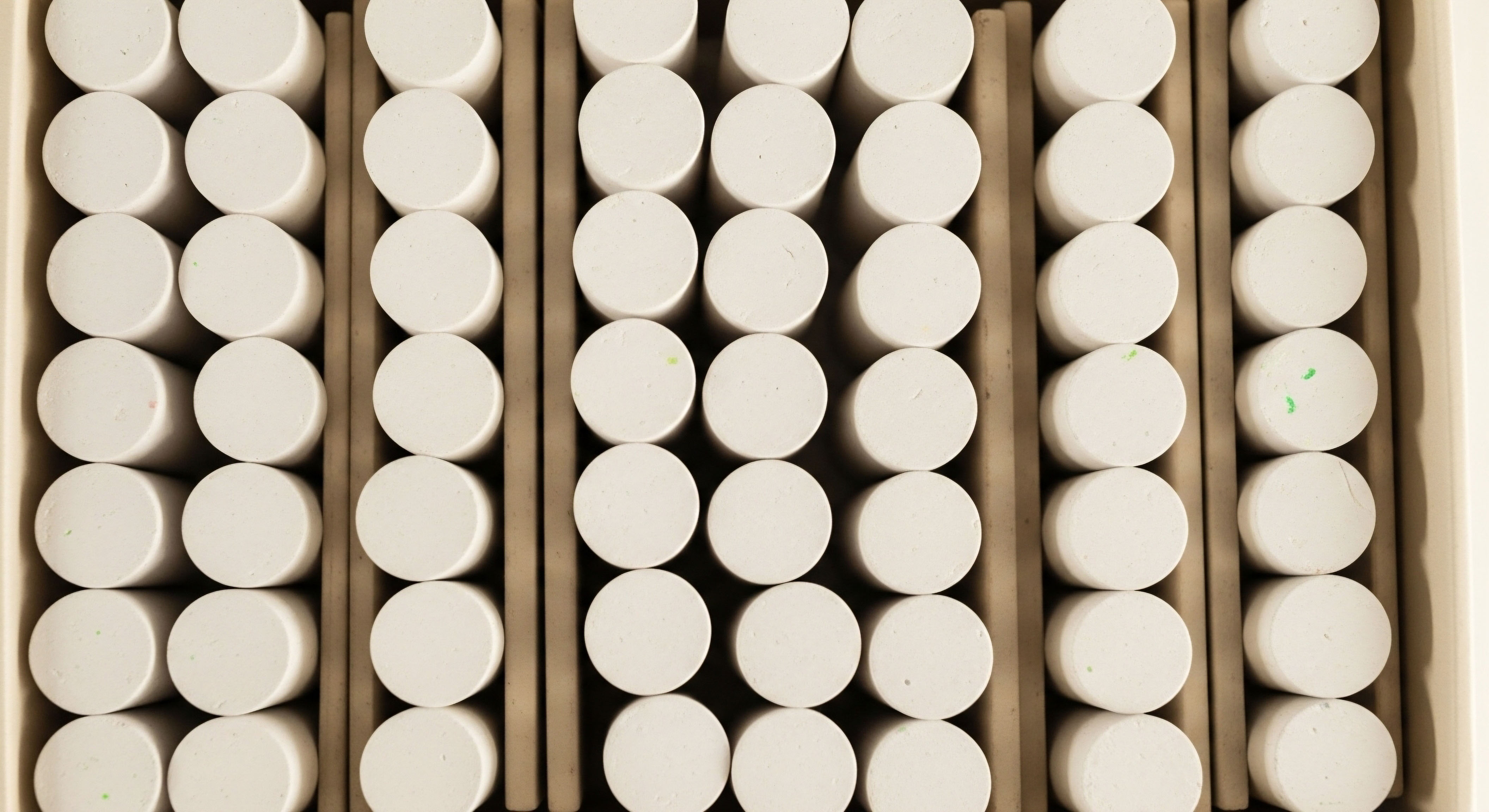

Fundamentals
Perhaps you have experienced a subtle shift in your well-being, a persistent feeling of being out of sync, or a general decline in vitality that defies simple explanation. Many individuals report symptoms such as persistent fatigue, unexpected weight changes, or a diminished sense of overall vigor.
These experiences often prompt a search for answers, leading to a deeper examination of the body’s intricate internal messaging systems. Understanding these biological networks offers a path toward reclaiming optimal function and a renewed sense of health.
At the heart of our physiological balance lies the gut microbiome, a vast and dynamic community of microorganisms residing within the digestive tract. This complex internal ecosystem, comprising trillions of bacteria, viruses, fungi, and other microbes, exerts a profound influence on nearly every aspect of human health, from mood regulation to metabolic processes.
Scientists increasingly recognize the gut microbiome as a virtual organ due to its extensive contributions to our physiological state. Its diverse composition plays a significant role in nutrient absorption, immune system modulation, and the synthesis of various compounds that interact with the body’s systems.
Among the body’s essential internal messengers are hormones, chemical signals that regulate countless bodily functions. Testosterone, a key androgen, plays a critical role in both men and women. In men, it supports muscle development, metabolic regulation, mood stability, and sexual drive. For women, testosterone contributes to energy levels, bone density, and sexual well-being. When testosterone levels are suboptimal, individuals may experience a range of symptoms, including reduced libido, difficulty with concentration, changes in body composition, and persistent tiredness.
The connection between the gut and hormonal balance is a bidirectional relationship, where each system influences the other’s function. Microbes within the digestive system metabolize and produce hormones, directly affecting their circulating levels. Conversely, hormones can alter the gut environment, impacting factors such as gut motility, intestinal barrier integrity, and the composition of microbial communities. An imbalance within this microbial community, known as gut dysbiosis, can significantly disrupt hormonal regulation.
The gut microbiome, a complex internal ecosystem, acts as a virtual organ with extensive influence over hormonal balance and overall physiological well-being.
Dysbiosis occurs when the beneficial microbial species within the gut are outnumbered by less favorable or more inflammatory microorganisms. This imbalance can lead to elevated levels of certain bacterial enzymes, such as beta-glucuronidase, which can reactivate hormones that the body intended for excretion. This recycling process can lead to unpredictable hormone levels and may exacerbate symptoms of hormonal imbalance. Addressing this microbial imbalance is a foundational step in supporting the body’s inherent capacity for hormonal equilibrium.


Intermediate
Understanding the intricate interplay between gut health and hormonal regulation becomes particularly relevant when considering protocols like testosterone replacement therapy, often referred to as hormonal optimization protocols. While these protocols aim to restore circulating testosterone to optimal levels, the long-term success and overall experience can be significantly influenced by the underlying state of the gut microbiome. An imbalanced gut environment can complicate treatment outcomes, potentially leading to suboptimal responses or increased side effects.
One significant mechanism through which gut dysbiosis impacts testosterone metabolism involves the enzyme beta-glucuronidase. This enzyme, produced by certain gut bacteria, plays a role in the enterohepatic circulation of hormones. After hormones like testosterone and estrogen are processed by the liver and conjugated for excretion, beta-glucuronidase can deconjugate them in the intestines, allowing them to be reabsorbed into the bloodstream.
When dysbiosis leads to an overgrowth of bacteria that produce excessive beta-glucuronidase, it can result in increased reabsorption of these hormones, leading to unpredictable circulating levels. This phenomenon can contribute to conditions like estrogen dominance, which may present with symptoms such as breast tenderness or weight gain, even during testosterone administration.
Beyond enzymatic activity, chronic inflammation stemming from gut dysbiosis can profoundly disrupt endocrine system regulation. Harmful gut bacteria can proliferate and release pro-inflammatory compounds, such as lipopolysaccharides (LPS). These endotoxins can compromise the intestinal barrier, leading to a “leaky gut,” and enter the bloodstream, triggering systemic inflammation.
Once in circulation, LPS can interfere with the delicate signaling pathways of the hypothalamic-pituitary-gonadal (HPG) axis, a central regulatory system for sex hormones. This interference can impair the production and release of gonadotropin-releasing hormone (GnRH) from the hypothalamus, which in turn affects the pituitary gland’s ability to produce luteinizing hormone (LH) and follicle-stimulating hormone (FSH).
Both LH and FSH are essential for stimulating the gonads to produce testosterone. Consequently, chronic gut inflammation can lead to reduced testosterone synthesis, complicating the effectiveness of external testosterone administration.
Gut dysbiosis can undermine hormonal optimization protocols by altering hormone recycling and inducing systemic inflammation that disrupts the body’s natural hormone production pathways.
For individuals undergoing testosterone replacement therapy for men, typically involving weekly intramuscular injections of Testosterone Cypionate, maintaining gut health is a critical consideration. Standard protocols often include Gonadorelin to preserve natural testosterone production and fertility, and Anastrozole to manage estrogen conversion. If gut dysbiosis is present, the body’s ability to metabolize and excrete excess estrogens, even with Anastrozole, may be compromised due to elevated beta-glucuronidase activity. This can lead to persistent side effects or a less stable hormonal environment.
Similarly, for women receiving testosterone replacement therapy, often with Testosterone Cypionate via subcutaneous injection or long-acting pellets, gut health plays a significant role. Women’s protocols may also involve Progesterone and Anastrozole. The gut microbiome influences estrogen metabolism through the estrobolome, a collection of gut bacteria that produce enzymes modulating estrogen levels.
An imbalance in this estrobolome can lead to excessive or insufficient estrogen circulation, impacting the overall balance of female hormones and potentially affecting the efficacy of prescribed hormonal agents.
Addressing gut dysbiosis in conjunction with hormonal optimization protocols involves a multi-pronged approach aimed at restoring microbial balance and reducing inflammation.

Strategies for Supporting Gut Health during Hormonal Optimization
- Dietary Interventions ∞ A diet rich in diverse fiber from whole grains, vegetables, and legumes supports beneficial gut bacteria and helps lower beta-glucuronidase levels. Incorporating anti-inflammatory foods, such as turmeric and omega-3-rich fish, can also reduce gut inflammation.
- Probiotic Supplementation ∞ Specific probiotic strains, including Lactobacillus rhamnosus and Bifidobacterium lactis, can help restore gut balance and reduce beta-glucuronidase activity. Probiotics also modulate the immune system and decrease inflammation.
- Prebiotic Consumption ∞ These non-digestible fibers act as food sources for beneficial gut bacteria, promoting microbial balance and the production of short-chain fatty acids (SCFAs). SCFAs are vital for maintaining gut health and influencing metabolic functions.
- Targeted Supplements ∞ Compounds like Calcium-D-Glucarate can inhibit beta-glucuronidase activity, promoting the proper excretion of conjugated hormones. Liver-supportive supplements may also enhance the liver’s detoxification capacity.
- Stress Management ∞ Chronic stress elevates cortisol, which can negatively impact gut health by altering gut transit time and intestinal permeability. Practices like mindfulness and yoga can help regulate cortisol and support a healthy microbiome.
The composition of the gut microbiome can significantly impact insulin sensitivity, a factor closely linked to testosterone balance, particularly in conditions like polycystic ovary syndrome (PCOS) and hypogonadism. Dysbiosis can lead to insulin resistance, making weight management more challenging and potentially affecting overall hormonal regulation.
| Gut State | Key Characteristics | Hormonal Impact |
|---|---|---|
| Healthy Microbiome | High microbial diversity, balanced beta-glucuronidase activity, robust gut barrier, ample SCFA production. | Supports optimal hormone metabolism, efficient excretion of conjugated hormones, reduced systemic inflammation, improved insulin sensitivity. |
| Dysbiotic Microbiome | Reduced diversity, elevated beta-glucuronidase, compromised gut barrier, increased LPS production, altered SCFA levels. | Excessive hormone reabsorption, increased systemic inflammation, disrupted HPG axis signaling, impaired testosterone synthesis, insulin resistance. |
Considering these interactions, a comprehensive approach to hormonal optimization protocols extends beyond simply administering hormones. It requires a thoughtful assessment and support of the gut microbiome to ensure the body can effectively utilize and metabolize these biochemical agents, leading to more predictable and beneficial long-term outcomes.


Academic
The profound influence of gut dysbiosis on the long-term outcomes of testosterone replacement therapy extends deep into the molecular and systems-level physiology of the human body. To truly appreciate this complexity, one must consider the gut microbiome not merely as a collection of microorganisms, but as a dynamic endocrine organ itself, capable of synthesizing and modulating a vast array of bioactive compounds that directly interact with host endocrine pathways.
A central mechanism involves the enterohepatic circulation of steroid hormones. After testosterone and its metabolites, including estrogens, are conjugated in the liver (typically through glucuronidation or sulfation) to become water-soluble for excretion via bile, they enter the intestinal lumen. Here, certain gut bacteria, particularly those within the estrobolome, produce enzymes like beta-glucuronidase.
This enzyme deconjugates the hormones, reactivating them and allowing their reabsorption into the systemic circulation. In a state of dysbiosis, an overabundance of beta-glucuronidase-producing bacteria, such as certain species of Bacteroides and Clostridia, can lead to excessive deconjugation and reabsorption.
This can result in elevated circulating levels of active hormones, including estrogens, which can then compete with or alter the effects of exogenously administered testosterone, leading to unpredictable therapeutic responses and potential side effects like gynecomastia or fluid retention.
Beyond direct hormonal recycling, gut dysbiosis precipitates a state of chronic, low-grade systemic inflammation. The compromised integrity of the intestinal barrier, often termed “leaky gut,” allows bacterial components like lipopolysaccharides (LPS) to translocate from the gut lumen into the bloodstream.
LPS acts as a potent endotoxin, triggering a robust immune response and the release of pro-inflammatory cytokines such as interleukin-1 beta (IL-1β), interleukin-6 (IL-6), and tumor necrosis factor-alpha (TNF-α). These inflammatory mediators directly interfere with the delicate regulation of the hypothalamic-pituitary-gonadal (HPG) axis.
The gut microbiome’s metabolic activities and inflammatory signaling directly modulate the efficacy and safety of hormonal optimization protocols.
Chronic inflammation can suppress the pulsatile release of gonadotropin-releasing hormone (GnRH) from the hypothalamus, which is essential for stimulating the pituitary gland to secrete luteinizing hormone (LH) and follicle-stimulating hormone (FSH). LH, in particular, is the primary signal for testicular Leydig cells to synthesize testosterone.
Therefore, even with external testosterone administration, persistent inflammation can hinder the body’s intrinsic capacity for hormonal regulation, potentially leading to a greater reliance on external sources and complicating the long-term management of hormonal balance. This systemic inflammatory state can also impair the liver’s capacity for effective hormone detoxification, further compounding the issue of hormonal dysregulation.
The gut microbiome also influences metabolic health, which is intimately linked to testosterone status. Conditions like insulin resistance and obesity are frequently associated with gut dysbiosis and can negatively impact testosterone levels and the effectiveness of its replacement.
Certain bacterial species, such as Prevotella copri and Bacteroides vulgatus, have been correlated with increased levels of branched-chain amino acids (BCAAs) in insulin-resistant individuals, contributing to glucose dysregulation. Conversely, beneficial microbial metabolites, such as short-chain fatty acids (SCFAs) like butyrate, propionate, and acetate, produced by the fermentation of dietary fibers, play a vital role in maintaining intestinal barrier integrity, reducing inflammation, and enhancing insulin sensitivity.
Butyrate, for instance, serves as a primary energy source for colonocytes and possesses histone deacetylase (HDAC) inhibitory activity, influencing gene expression and potentially impacting neurotransmitter levels and neuroinflammation.
Research indicates a bidirectional relationship where testosterone itself can influence the composition of the gut microbiome. Studies involving testosterone administration in transgender individuals have shown changes in microbial abundance and metabolic pathways, such as an increase in pathways that generate glutamate and a decrease in those that consume it.
This suggests a competition between the host and microbiota for dietary glutamate, with implications for arginine synthesis and overall microbial metabolism. Animal models, such as castrated-obese male rats, demonstrate that testosterone replacement can impact gut dysbiosis, and interventions like inulin supplementation can modulate microbial diversity.

Microbial Influences on Testosterone and Metabolic Pathways
| Microbial Factor | Mechanism of Action | Impact on Testosterone/Metabolism | Relevant Studies |
|---|---|---|---|
| Beta-Glucuronidase Producers (e.g. Bacteroides, Clostridia) | Deconjugate hormones in the gut, allowing reabsorption into circulation. | Increases circulating active estrogens, potentially complicating TRT outcomes and contributing to estrogen dominance. | Sui et al. (2021), Ervin et al. (2019), Shiwan Hu et al. (2023) |
| Lipopolysaccharides (LPS) | Endotoxins from Gram-negative bacteria that cross a compromised gut barrier, triggering systemic inflammation. | Disrupts HPG axis signaling, impairs testosterone synthesis, reduces liver detoxification capacity. | Morse (2025) |
| Short-Chain Fatty Acids (SCFAs) (Butyrate, Propionate, Acetate) | Products of fiber fermentation by beneficial bacteria (e.g. Firmicutes, Bacteroidetes). Maintain gut barrier, reduce inflammation, influence host metabolism. | Improve insulin sensitivity, reduce systemic inflammation, indirectly support optimal testosterone synthesis and action. | Portincasa et al. (2022), Hernández et al. (2019) |
| Akkermansia muciniphila | Associated with healthier metabolic function and gut barrier integrity. | Linked to healthier testosterone levels and improved metabolic outcomes. | Everard et al. (2013), Morse (2025) |
| Lactobacillus and Bifidobacterium species | Beneficial bacteria that can reduce beta-glucuronidase activity and modulate immune responses. | Support balanced hormone metabolism, reduce inflammation, and improve gut barrier function, indirectly benefiting TRT. | Morse (2025) |
| Clostridium scindens | Human gut microbe encoding 20α-hydroxysteroid dehydrogenase (HSDH). | Potential to convert glucocorticoids into androgens, influencing the overall androgen pool. | Ridlon et al. (2013) |
The complex interaction between the gut microbiome and the endocrine system highlights that optimizing testosterone levels through external administration is only one part of a larger physiological equation. Long-term success in hormonal optimization protocols necessitates a comprehensive strategy that includes assessing and actively supporting gut health. This integrated approach can mitigate adverse effects, enhance the efficacy of administered hormones, and ultimately contribute to a more stable and resilient endocrine environment, allowing individuals to experience sustained vitality and function.

References
- Sui, Y. Wu, J. & Chen, J. The Role of Gut Microbial Beta-Glucuronidase in Estrogen Reactivation and Breast Cancer. Frontiers in Cell and Developmental Biology. 2021;9:631552.
- Ervin, S. M. Li, H. Lim, L. et al. Gut Microbial Beta-Glucuronidases Reactivate Estrogens as Components of the Estrobolome That Reactivate Estrogens. The Journal of Biological Chemistry. 2019;294(49):18586-18599.
- Shiwan Hu, Qiyou Ding, Wei Zhang, Mengjiao Kang, Jing Ma & Linhua Zhao. Gut microbial beta-glucuronidase ∞ a vital regulator in female estrogen metabolism. Article ∞ 2236749. 2023; Published online ∞ 09 Aug 2023.
- Morse, L. Gut Microbiome and Hormonal Balance ∞ Key Clinical Insights for Practitioners. Vibrant Wellness. 2025-05-28.
- Pires, L. Gonzalez-Paramás, A. M. Heleno, S. A. & Calhelha, R. C. Gut Microbiota as an Endocrine Organ ∞ Unveiling Its Role in Human Physiology and Health. Applied Sciences. 2024; 14(20), 9383.
- Neuman, H. Debelius, J. W. Knight, R. & Koren, O. Microbial endocrinology ∞ the interplay between the microbiota and the endocrine system. FEMS Microbiology Reviews. 2015; 39(4):509-521.
- Qi, X. Yun, C. Pang, Y. & Qiao, J. The impact of the gut microbiota on the reproductive and metabolic endocrine system. Gut Microbes. 2021; 13(1):1894070.
- Chunchai, T. Keawtep, P. Arinno, A. et al. A combination of an antioxidant with a prebiotic exerts greater efficacy than either as a monotherapy on cognitive improvement in castrated-obese male rats. Article. 2020 Dec.
- González-Velázquez, G. Aguirre-Garrido, J. F. Oros-Pantoja, R. et al. Supplementation with inulin reverses cognitive flexibility alterations and modulates the gut microbiota in high-fat-fed mice. Article. 2024 Nov.
- Santos-Marcos, J. A. Mora-Ortiz, M. Tena-Sempere, M. Lopez-Miranda, J. & Camargo, A. Interaction between gut microbiota and sex hormones and their relation to sexual dimorphism in metabolic diseases. Biology of Sex Differences. 2023; 14(1):4.
- Ridlon, J. M. Ikegawa, S. Alves, J. M. P. et al. Clostridium scindens ∞ a human gut microbe with a high potential to convert glucocorticoids into androgens. Journal of Lipid Research. 2013; 54(9):2437-2449.
- Portincasa, P. Bonfrate, L. Vacca, M. et al. Gut Microbiota and Short Chain Fatty Acids ∞ Implications in Glucose Homeostasis. International Journal of Molecular Sciences. 2022; 23(3):1105.
- Hernández, M. A. G. Canfora, E. E. Jocken, J. W. E. & Blaak, E. E. The Short-Chain Fatty Acid Acetate in Body Weight Control and Insulin Sensitivity. Nutrients. 2019; 11(8):1943.
- Everard, A. Belzer, C. Geurts, L. et al. Cross-talk between Akkermansia muciniphila and intestinal epithelium controls diet-induced obesity. Proceedings of the National Academy of Sciences. 2013; 110(22):9066-9071.
- Kootte, R. S. Levin, E. Salojärvi, J. et al. Improvement of insulin sensitivity after lean donor feces in metabolic syndrome is driven by baseline intestinal microbiota composition. Cell Metabolism. 2017; 26(4):611-619.e6.

Reflection
Considering the intricate biological systems discussed, it becomes clear that true well-being is not a static destination but a dynamic process of understanding and adaptation. The insights shared here, from the microscopic world of gut bacteria to the far-reaching influence of hormones, offer a framework for personal exploration.
This knowledge is a starting point, inviting you to consider your own unique biological landscape. How might these connections resonate with your personal health journey? What steps might you consider to support your internal balance? The path to reclaiming vitality is often a personalized one, guided by a deeper appreciation for your body’s remarkable intelligence and its capacity for self-regulation.



